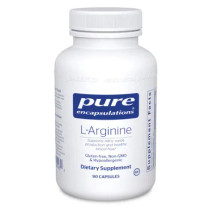Amino Acid Supplements
Amino acids, the "building blocks of protein" and one of the foundations of life, play a pivotal role in various bodily functions. They contribute to protein synthesis, muscle and joint formation and repair, neurotransmitter function, and metabolic processes, just to name a few. Given their critical role in health and performance, amino acid supplements have become a cornerstone for athletes, fitness enthusiasts, and anyone looking to optimize their energy and performance. Simply Nutrients offers a comprehensive selection of amino acid supplements designed to support your body's needs for different types of these essential compounds.
Role and Benefits of Amino Acid Supplements
Amino acids, which are naturally found in foods with protein, are indispensable for maintaining muscle health, supporting metabolism, and promoting recovery. Supplementing with amino acids can offer a wide range of benefits for both your physical and mental health, such as:
- Muscle Growth and Repair: Essential amino acids, particularly branched-chain amino acids (or BCAAs), are crucial for muscle protein synthesis, which helps to build muscle mass and strength, and can aid in muscle recovery post-exercise.
- Enhanced Physical Performance: Amino acids can improve endurance and reduce fatigue by serving as an energy source during prolonged exercise. They essentially "feed" muscle tissue, leading to greater performance, and then repair muscles following exercise.
- Mood and Cognitive Function: Certain amino acids, such as tryptophan, are precursors to neurotransmitters like serotonin, giving them the ability to positively influence your mood, sleep, and cognitive function.
- Metabolic Health: Amino acids play a role in metabolic pathways, supporting energy production and efficient metabolism.
Types of Amino Acid Supplements
Simply Nutrients' amino acid supplements are formulated with key amino acids known for their health-promoting properties, including:
- Branched-Chain Amino Acids (BCAAs): Leucine, isoleucine, and valine support muscle growth, reduce exercise-induced muscle soreness, and provide energy during workouts.
- L-Glutamine: Supports gut health, immune function, and muscle recovery, making it a popular choice among athletes.
- L-Tryptophan: A precursor to serotonin, L-tryptophan supports mood regulation, sleep quality, and overall well-being. You'll find this compound in supplements geared towards relaxation and improving sleep quality.
- L-Arginine: Involved in protein synthesis and nitric oxide production, L-arginine can enhance blood flow and cardiovascular health.
- L-Carnitine: This type facilitates the transport of fatty acids into mitochondria for energy production, supporting endurance and fat metabolism. It's often used to help with stamina, performance, and maintenance of a healthy body composition.
Choosing the Right Amino Acid Supplement For Your Needs
Recognizing the unique health goals and challenges of each individual, Simply Nutrients provides a variety of amino acid supplements to suit different needs, such as support for exercise performance, recovery, sleep, and cognitive function. Our amino acid supplements come in forms including:
- Comprehensive Amino Acid Complexes: For overall health and wellness, offering a balanced spectrum of essential amino acids that can aid in the maintenance of lean muscle mass, joint health, gut function, and mental well-being.
- Focused Formulas: Targeted supplements providing specific amino acids, such as BCAAs for muscle support or L-glutamine for gut health.
- Specialized Solutions for Specific Concerns: Some products are designed for particular outcomes, such as coping with stress, improving focus, mood support, or metabolic health.
FAQs
How do I choose the right amino acid supplement?
Consider your specific goals and needs, such as whether you're primarily focusing on physical benefits and fitness-related goals or cognitive perks. Our product descriptions and a consultation with a healthcare professional can help guide your selection.
Can amino acid supplements be taken daily?
Yes, amino acid supplements can be taken daily, but it's important to follow the recommended dosage and timing suggestions for optimal effects. For example, some amino acids are best taken on an empty stomach which boosts absorption, while others should ideally be taken before or after exercise.
Are there any side effects of taking amino acid supplements?
Amino acid supplements are generally very safe when taken as directed, but excessive intake of certain amino acids can have adverse effects, including indigestion. Always adhere to recommended dosages and instructions. If you take medications, get your provider's advice before taking any new supplements to avoid side effects.
When will I notice the benefits of taking amino acid supplements?
While individual responses vary, many users report feeling improvements in energy, recovery, and overall well-being within just a few weeks of consistent use. Amino acid supplements offer the greatest benefits when combined with a healthy diet that includes enough protein, exercise, and adequate sleep.
Key Takeaways on Amino Acid Supplements
Amino acid supplements offer a targeted approach to support muscle and joint health, enhance performance, promote restful sleep, and encourage mental well-being. With Simply Nutrients' carefully selected range of amino acid products, you can confidently incorporate these vital nutrients into your fitness and wellness routine as a step toward achieving your health goals.























